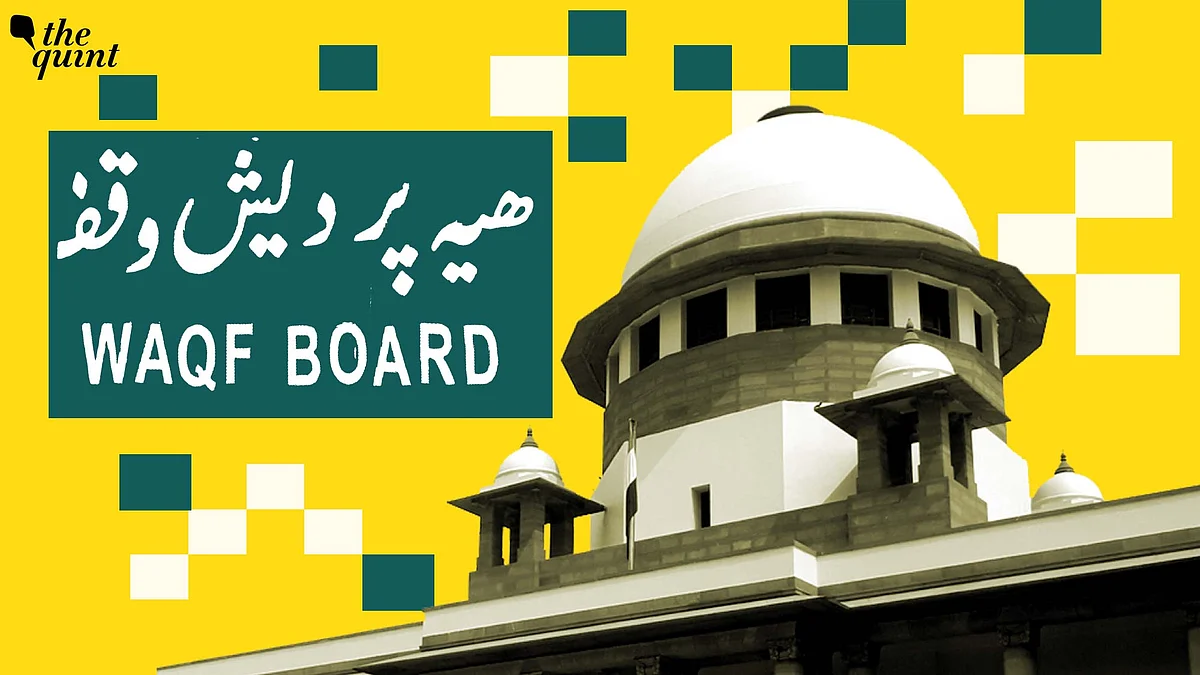
SC’s Tough Questions on Waqf Law Reveal Its Constitutionally Suspect Nature
The Supreme Court’s handling of the case is a litmus test for its commitment to uphold core constitutional values.

advertisement
The Supreme Court’s recent hearings on the Waqf (Amendment) Act 2025 have exposed the cracks in the design, and the intent of a law believed to be resting on constitutionally shaky ground.
The new law, particularly criticised as a legislative overreach, is exemplary of the Bharatiya Janata Party-led central government’s ongoing push to erode the last remnants of constitutionally guaranteed autonomy of religious minorities, especially Muslims.
In spite of the government’s ferocious defence of the law inside and outside the courtroom, the court’s securing of its assurance on two critical provisions of the new law is telling. This assurance came after the court flagged three key aspects of the new law and indicated its inclination to stay them.
Supreme Court's Big Concerns
The apex court halted non-Muslim appointments to Waqf boards and maintained the status quo on Waqf properties — including those classified as “Waqf by user” until the next hearing on 5 May 2025.
The court also raised strong objections to the expanded powers granted to district collectors to reclassify “disputed” Waqf land, signalling unease with the potential for executive overreach.
The Supreme Court’s sharp scrutiny of the denotification of “Waqf by user” properties stands out in the hearings.
Abhishek Manu Singhvi, one of the advocates appearing for the petitioners, highlighted that nearly half of all Waqf properties fall under this category — properties not formally registered but traditionally used for religious or charitable purposes for a long time.
Under the new law, district collectors get authority to denotify these properties if classified as government land, risking the dispossession of centuries-old mosques, graveyards, and shrines.
The provision that any land disputed by the government would lose its Waqf status pending the final resolution is particularly appalling. Chief Justice Sanjiv Khanna has rightly cautioned that such denotification “can have grave ramifications.”
Equally important is the court’s flagging of the provision allowing non-Muslims to be appointed to Central Waqf Council and state Waqf Boards — an unprecedented move that jeopardises religious autonomy.
The court has voiced the same concern. In a pointed moment during the hearing, the Bench challenged the government’s defence by drawing a parallel: “Why not have non-Hindus also in the advisory board of Hindu endowments, then?”
'When We Sit On Bench, We Lose Our Religion'
The judges’ retort that they “lose their religion” and remain “absolutely secular” while discharging judicial duties is reassuring in the current political atmosphere. This statement reaffirms the court’s commitment to fairness — free from personal beliefs, political pressure, and majoritarian sentiment.
Over the past couple of years, the judiciary has faced criticism for perceived alignment with the hegemonic ideological and religious interests. The Supreme Court in particular has often taken a cautious, even deferential approach in politically sensitive matters. Its assertiveness in this case, thus, marks a notable departure.
Judiciary at a Crossroads — Again
Scrutiny of the suspect nature of the new law aside, one cannot ignore the blind spots in the court’s overall dealing of the case so far.
By allowing the government to pre-empt a stay, the court has essentially granted the centre leverage to reframe the debate, as seen in past cases.
In May of 2022, in the sedition case, after the court expressed inclination to strike down the law, the Centre stated its intention to reconsider the law.
Again, in the Article 370 case, the Centre pre-empted a court order on the Parliament’s power to downgrade a State to a Union Territory by strategically stating that it would restore the statehood of Jammu and Kashmir in due time. These instances are reflective of the government’s strategic manoeuvring to stall potentially unfavourable court orders.
The Supreme Court’s handling of the Waqf law is a litmus test for its commitment to upholding core constitutional values. Introduced in August 2024, the law was referred to a Joint Parliamentary Committee (JPC). Yet, all the accepted 14 amendments were introduced by the BJP and its allies; none from the Opposition.
As the case moves toward its next hearing, the court faces a familiar challenge: Will it stay the course or give way to procedural delays and political pressure? History casts some doubts as the judiciary has shown initial resolve in cases like marriage equality, only to retreat into procedural caution or inaction.
The deliberations on the Waqf law are a moment for the judiciary to reclaim its role as a constitutional watchdog against political majoritarianism.
The court's initial willingness to act offers a hopeful yet cautious aspiration toward preserving constitutional protections. Whether it translates into substantial relief for Muslims remains to be seen.
(Burhan Majid teaches legal and constitutional theory at the School of Law, Jamia Hamdard, New Delhi. He tweets at @BurhanMajid. This is an opinion piece and the views expressed above are the author’s own. The Quint neither endorses nor is responsible for them.)
- Access to all paywalled content on site
- Ad-free experience across The Quint
- Early previews of our Special Projects
Published: undefined